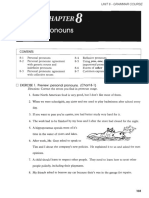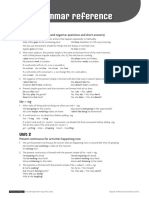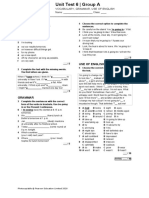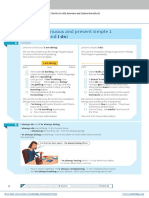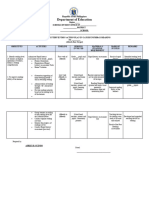Present Simple Vs Continuous
Uploaded by
Victoria PrietoPresent Simple Vs Continuous
Uploaded by
Victoria PrietoCambridge University Press
978-1-108-58662-7 — English Grammar in Use Book with Answers and Interactive eBook
Raymond Murphy
Excerpt
More Information
Unit Present continuous and present simple 1
3 (I am doing and I do)
A Compare:
present continuous (I am doing) present simple (I do)
We use the continuous for things happening at We use the simple for things in general or things
or around the time of speaking. that happen repeatedly.
The action is not complete.
I am doing I do
past now future past now future
The water is boiling. Be careful. Water boils at 100 degrees Celsius.
Listen to those people. What language Excuse me, do you speak English?
are they speaking?
Let’s go out. It isn’t raining now. It doesn’t rain very much in summer.
‘I’m busy.’ ‘What are you doing?’ What do you usually do at weekends?
I’m getting hungry. Let’s go and eat. I always get hungry in the afternoon.
Kate wants to work in Italy, so she’s Most people learn to swim when they
learning Italian. are children.
The population of the world is Every day the population of the world
increasing very fast. increases by about 200,000 people.
We use the continuous for temporary situations We use the simple for permanent situations
(things that continue for a short time): (things that continue for a long time):
I’m living with some friends until I find a My parents live in London. They have
place of my own. lived there all their lives.
a: You’re working hard today. Joe isn’t lazy. He works hard most of
b: Yes, I have a lot to do. the time.
See Unit 1 for more information. See Unit 2 for more information.
B I always do and I’m always doing
I always do something = I do it every time:
I always go to work by car. (not I’m always going)
I’m always doing something = I do it too often or more often than normal.
For example:
I’ve lost my keys again. I’m always losing them.
I’m always losing them = I lose them too often,
or more often than normal.
Paul is never satisfied. He’s always complaining. (= he complains too much)
You’re always looking at your phone. Don’t you have anything else to do?
6 How long
Present have you and
continuous (been) Unit114
… ? 2 ➜Unit
simple Present tenses for the future ➜ Unit 19
© in this web service Cambridge University Press www.cambridge.org
Cambridge University Press
978-1-108-58662-7 — English Grammar in Use Book with Answers and Interactive eBook
Exercises
Raymond Murphy
Excerpt
More Information
3.1 Are the underlined verbs OK? Correct them where necessary.
1 Water boils at 100 degrees Celsius. OK
2 How often are you going to the cinema? do you go
3 Ben tries to find a job, but he hasn’t had any luck yet. tries
4 Martina is phoning her mother every day. is phonis
5 The moon goes round the earth in about 27 days.
6 Can you hear those people? What do they talk about? does they talking
7 What do you do in your spare time? do you do
8 Sarah is a vegetarian. She doesn’t eat meat. doesn't eating
9 I must go now. It gets late. getes
10 ‘Come on! It’s time to leave.’ ‘OK, I come.’
11 Paul is never late. He’s always starting work on time. alwaies starting
12 They don’t get on well. They’re always arguing. alwaies arguing
3.2 Put the verb into the correct form, present continuous or present simple.
1 a I usually get (I / usually / get) hungry in the afternoon.
b I’m getting (I / get) hungry. Let’s go and eat something.
Are you listening
2 a ‘ (you / listen) to the radio?’ ‘No, you can turn it off.’
b ‘ Do you listen (you / listen) to the radio a lot?’ ‘No, not very often.’
3 a The River Nile flows (flow) into the Mediterranean.
b The river is flowing (flow) very fast today – much faster than usual.
4 a I’m not very active. I don't do do you (I / not / do) any sport.
b What usualling do (you / usually / do) at weekends?
5 a Rachel is in New York right now. she is staying (She / stay) at the Park Hotel.
b she always stays (She / always / stay) there when she’s in New York.
3.3 Put the verb into the correct form, present continuous or present simple.
1 Why are all these people here? What’s happening (What / happen)?
2 Julia is good at languages. (She / speak) four languages very wel
3 Are you ready yet? she speaks Everybody (Everybody / wait) for you.
is waitung
4 I’ve never heard this word. How (you / pronounce) it?
do You pron(not ounc e
5 Kate is not working / work) this week. She’s on holiday.
6 I think my English (improve) slowly. It’s better than it was.
is Improving
7 Nicola (live) in Manchester. She has never lived anywhere else.
lives
8 Can we stop walking soon? I'm starting (I / start) to get tired.
9 Sam and Tina are in Madrid right now. They're visiting (They / visit) a friend of th
10 ‘What does your father do (your father / do)?’ ‘He’s an architect.’
11 It took me an hour to get to work this morning. Most days It doesn't take
(it / not / take) so long.
12 I am learning (I / learn) to drive. My driving test is next month. My father
is teaching
(teach) me.
3.4 Finish B’s sentences. Use always -ing.
1 a: I’ve lost my keys again.
b: Not again! You’re always losing your keys
2 a: The car has broken down again.
b: That car is useless. It is always breaking down
3 a: Look! You’ve made the same mistake again.
b: Oh no, not again! I 'm always making the same mistake
4 a: Oh, I’ve left my phone at home again.
b: Typical! you're always leaving your phone at home
© in this web service Cambridge University Press www.cambridge.org
You might also like
- Focus4 2E Grammar Quiz Unit1 5 GroupA B ANSWERSNo ratings yetFocus4 2E Grammar Quiz Unit1 5 GroupA B ANSWERS1 page
- GetReadyForInvalsi Soluzioni TapescriptNo ratings yetGetReadyForInvalsi Soluzioni Tapescript11 pages
- Exercise: Voiceless Velar Central Oral Stop Noiced Alveolar Central Nasal StopNo ratings yetExercise: Voiceless Velar Central Oral Stop Noiced Alveolar Central Nasal Stop5 pages
- Success Can Be A Game With Many Players: A Successful Organ IsationNo ratings yetSuccess Can Be A Game With Many Players: A Successful Organ Isation2 pages
- I. Put The Verbs in Brackets in The Correct Tenses: PRESENT SIMPLE, PRESENT Continuous, Past Simple or Past ContinuousNo ratings yetI. Put The Verbs in Brackets in The Correct Tenses: PRESENT SIMPLE, PRESENT Continuous, Past Simple or Past Continuous7 pages
- Passive (1) in Simple Present, Simple Past, Simple Future Tense100% (1)Passive (1) in Simple Present, Simple Past, Simple Future Tense7 pages
- EXERCISE 1. Preview: Personal Pronouns. (Chart 8-1) : Directions100% (2)EXERCISE 1. Preview: Personal Pronouns. (Chart 8-1) : Directions20 pages
- Than (Small) Room in The Hotel. The Weather Was Terrible Too. It Was The Coldest (Cold) in England. The Beach Near The Hotel Was Very Dirty - It WasNo ratings yetThan (Small) Room in The Hotel. The Weather Was Terrible Too. It Was The Coldest (Cold) in England. The Beach Near The Hotel Was Very Dirty - It Was3 pages
- Mid-Term Exam For Family and Friends 2 LEVEL E2C (Unit 9-10)No ratings yetMid-Term Exam For Family and Friends 2 LEVEL E2C (Unit 9-10)5 pages
- Vocabulary Describing People - Page 16URLNo ratings yetVocabulary Describing People - Page 16URL2 pages
- HighNote3 Grammar Quiz Unit06A GroupA B ANSWERSNo ratings yetHighNote3 Grammar Quiz Unit06A GroupA B ANSWERS1 page
- B1 Adjective - Adverb AD009: Fill in The Correct Form: Adjective or AdverbNo ratings yetB1 Adjective - Adverb AD009: Fill in The Correct Form: Adjective or Adverb2 pages
- Unit 5. Grammar Focus 1 Present Simple: Positive and Negative (He/she/it) - Add Letters To Complete The He/she/it Form of The VerbsNo ratings yetUnit 5. Grammar Focus 1 Present Simple: Positive and Negative (He/she/it) - Add Letters To Complete The He/she/it Form of The Verbs4 pages
- Exercise On Physical Appearance - Grade 5No ratings yetExercise On Physical Appearance - Grade 53 pages
- HighNote2 Unit Language Test Unit06 GroupANo ratings yetHighNote2 Unit Language Test Unit06 GroupA1 page
- Present Continuous (I Am Doing) : Un ItNo ratings yetPresent Continuous (I Am Doing) : Un It20 pages
- Because or Because of Esl Grammar Exercise Worksheet PDF100% (5)Because or Because of Esl Grammar Exercise Worksheet PDF2 pages
- The Complex Sentence: Nama: Banasfah Dini Ditiafani NPM: 04417518035No ratings yetThe Complex Sentence: Nama: Banasfah Dini Ditiafani NPM: 044175180354 pages
- Extra Grammar Exercises (Unit 10, Page 84) : Top Notch Fundamentals, Third EditionNo ratings yetExtra Grammar Exercises (Unit 10, Page 84) : Top Notch Fundamentals, Third Edition1 page
- Extra Grammar Exercises (Unit 10, Page 84) : Top Notch Fundamentals, Third EditionNo ratings yetExtra Grammar Exercises (Unit 10, Page 84) : Top Notch Fundamentals, Third Edition1 page
- The Five Characteristics of Language Are That It Is A SystemNo ratings yetThe Five Characteristics of Language Are That It Is A System4 pages
- 10 Sentences With Predicate and Subject Marked - Búsqueda de GoogleNo ratings yet10 Sentences With Predicate and Subject Marked - Búsqueda de Google1 page
- Finger Phonics Big Book 5 - JL6871 - AE Print IssuuNo ratings yetFinger Phonics Big Book 5 - JL6871 - AE Print Issuu8 pages
- Gic Intervention Action Plan in Catch Up Friday ReadingNo ratings yetGic Intervention Action Plan in Catch Up Friday Reading2 pages
- An Analysis of Collocations Used in Written AssignmentNo ratings yetAn Analysis of Collocations Used in Written Assignment82 pages
- I02 - Unit 04 Men & Women - Lesson A - For StudentsNo ratings yetI02 - Unit 04 Men & Women - Lesson A - For Students75 pages
- ENG-111-LEC-1812S Week 19 - Long Quiz 4No ratings yetENG-111-LEC-1812S Week 19 - Long Quiz 410 pages
- Календарно-тематичне планування до підручника On Screen 3No ratings yetКалендарно-тематичне планування до підручника On Screen 39 pages
- بحوث التخرج لطلبة قسم اللغة الانكليزية جامعةبغداد كلية اللغاتNo ratings yetبحوث التخرج لطلبة قسم اللغة الانكليزية جامعةبغداد كلية اللغات7 pages













